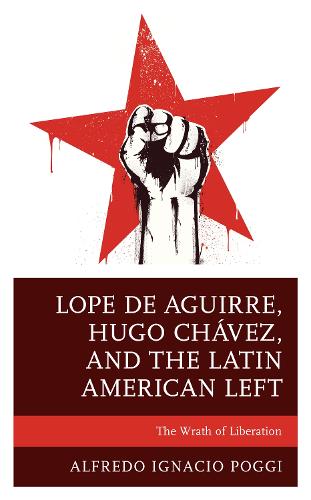
Lope de Aguirre, Hugo Chvez, and the Latin American Left: The Wrath of Liberation
(Paperback)
Publishing Details
Lope de Aguirre, Hugo Chvez, and the Latin American Left: The Wrath of Liberation
By (Author) Alfredo Ignacio Poggi
Bloomsbury Publishing PLC
Lexington Books
20th December 2021
United States
Classifications
Professional and Scholarly
Non Fiction
Colonialism and imperialism
Politics and government
980.013092
Physical Properties
Paperback
142
Width 154mm, Height 219mm, Spine 12mm
222g
Description
Lope de Aguirre, Anti-imperialism, and the Latin American Left: The Wrath of Liberation examines why anti-imperialist projects have the tendency to become tyrannies, with a focus on Latin America. Alfredo Ignacio Poggi discusses the figure of Lope de Aguirre, the first modern revolutionary leader, and his various historical representations in literature, essays, theater, film, and comics as a vehicle to interrogate the Latin American anti-imperialist imagination. Poggi argues that the experience of anger is a constituent element of Latin American anti-imperialism and that the social imaginary that emerged in the late nineteenth century following the intellectual tradition of liberation and the continental political left has a wrathful dimension capable of generating political programs of revenge, finding an echo in Latin American leaders like Che Guevara and Hugo Chvez. Poggi ultimately proposes to renovate liberationist thinking by offering mercy as an alternative anti-imperialist emotion that can overcome the dangers implicit in angers radicalization as wrath. Scholars of history, Latin American studies, international relations, and political science will find this book particularly useful.
Reviews
This book is original and insightfuloriginal because it approaches the dramatic and cruel figure of Lope de Aguirre through a new lens, and insightful in identifying possibilities for redirecting the long history of anti-imperial anger in new ways. Representations of Lope de Aguirre abound in Latin American literature, in essays, novels and drama, but here he is seen from a new perspective. This well-written study connects this early colonial figure to modern political movements within a Dantesque vision, and it humanizes and makes him more complex, not just an allegory of evil. This study inspires by its imaginative tracing of emotions in Latin American history and in its impetus to find a way out of the labyrinths that continue to entangle the region.
-- Gwen Kirkpatrick, Georgetown UniversityIn his investigative expedition, Dr. Poggi delves into one of the foundational concepts that has permeated the Latin American cultural imaginary, that of "anti-imperialism," teasing apart the roots of its characters and imaginary replicated in various historical periods and lately coopted by the Marxist/Leninist Chavismo. From an original disciplinary perspective, this book enriches the understanding of the Venezuelan and Latin American imaginary, marked by an ideology of liberating overtones, leading to a culture of learned helplessness and an external locus of exculpation.
-- Jess Mara Aguirre, Andrs Bello Catholic UniversityThis book is a must-read for all those interested in Latin America. It is an excellent contribution to the understanding of the pervasive anti-imperialist sentiments in Latin America. Poggi invites the reader to reflect on the complexities of the writing of history and demonstrates how a liberation project can and in many cases has become another avatar of oppression. In the end, Poggi offers the reader a cautionary tale on liberation projects, reminding us all that without forgiveness and merciful attitudes, they can foment other forms of oppression and violence.
-- Veronica Salles-Reese, Georgetown UniversityAuthor Bio
Alfredo Ignacio Poggi is assistant professor of literature and cultural studies in the Spanish and Portuguese department at the University of North Georgia.
